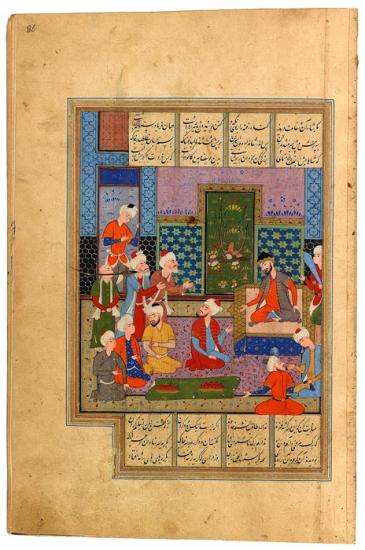Khusrau Seels Pardon from His Father

Khusrau Seels Pardon from His Father
Khamsa (Quintet), in Persian
Purchased by Pierpont Morgan, 1911
After a hunt, Prince Khusrau and his companions descend on a peasant's house, where drunken revelry ensues. Even the prince's horse breaks loose, trampling new crops. The punishment is severe: the horse's hooves are cut, and the prince's throne is given to the peasant. Khusrau, who begs two elders to plead for his pardon, exhibits strong remorse. Dressed in a shroud and weeping, he offers his sword and his head, saying that he could endure any sorrow but the anger of his father. Here, curiously, Khusrau holds the sword with his teeth! Hurmuzd is moved, kisses his son, forgives all, and restores him as crown prince. Khusrau (Chosroes II) was king of Persia from 590 until 628.)
This episode appears in Khusrau va Shīrīn (1180), the second story in Niẓāmī's Khamsa (Quintet).
Persian poetry
The Persians loved their poetry and their poets, though the Qur˒an warned against believing their words (sura 69.41) and "those straying in evil who follow them" (sura 26.224). While Arabic was the first language of Islam and the language of the Qur˒an, Persian was favored by poets. Even Firdausī's (940–1020) celebrated Shāhnāma (Book of Kings), the national epic of Persian, was written in verse—some 50,000 couplets! Rūmī (1207–1273), the best known of the Sufi poets, put poetry in perspective when he wrote, "A hundred thousand books of poetry existed / Before the word of the illiterate [Prophet] they were put to shame!" (Masnavī I, 529). Presented here are illustrations of Firdausī's Shāhnāma as well as works by Sa˓ dī (ca.1184–1292), Hāfiz (ca. 1320–1389), and Jāmī (1414–1492), regarded as the last of the great Sufi poets. Also featured are illustrations from each of the five poems of the Khamsa (Quintet), by Niẓāmī (ca. 1141–1209), especially Lailā and Majnūn (The Persian Romeo and Juliet) and Bahrām Gūr's Seven Princesses.